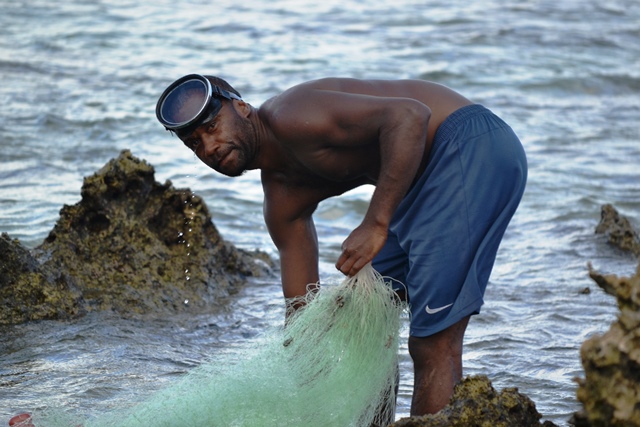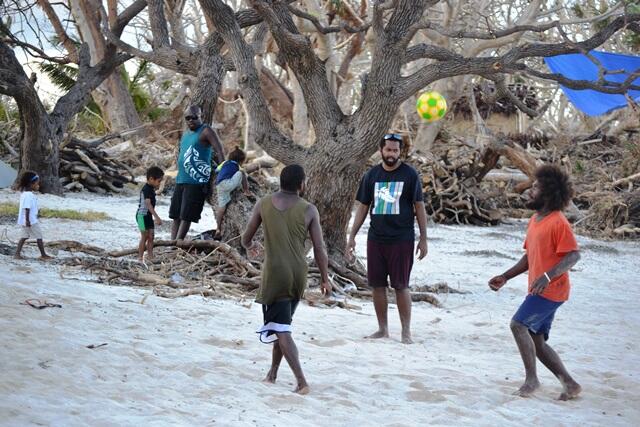MEN and boys are critical to a healthy population, albeit a general perception, this is an area women are responsible for. This attitude continues to be a barrier to a more robust engagement that has the potential to positively impact countries' health and development indicators.
Holistic approaches to aspects of population and development issues such as these are therefore critical. A cornerstone to sustainable progress in this area is the genuine and consistent participation of men and boys.
There are numerous examples of initiatives involving men and boys in the Pacific but one of the more popular stories have been a United Nations Population Fund (UNFPA) Pacific-supported non-scalpel vasectomy program, a family planning method for men, in collaboration with the Ministry of Health in the Solomon Islands.
Through the commitment of the ministry's reproductive health workers, the NSV gained popularity in the Solomon Islands. An essential element of the outreach was the "men space" where health workers would sit with men to discuss and answered questions around sexual and reproductive health and rights issues.
Another positive outcome of this program was the improved capacity within the Solomon Islands team. The country has since hosted numerous counterparts from other Pacific Island nations offering NSV training with the support of the UNFPA Pacific Sub-Regional Office.
The UNFPA has a strong mandate to work with men and boys complimenting work with women and young girls, and always within a human rights framework that recognises the sexual and reproductive health and reproductive rights, and bodily autonomy of both men and women.
The sexual and reproductive health needs of men received little attention until 1994 during the International Conference on Population and Development (ICPD) in Cairo, Egypt. It was at that meeting that global leaders acknowledged the role of men in shared responsibility in reproductive health and advancing gender equality.
The ICPD Program of Action (PoA) emphasised the need for "men's shared responsibility and active involvement in responsible parenthood; sexual and reproductive behaviour, including family planning; prenatal, maternal and child health; prevention of sexually transmitted diseases and HIV; prevention of unwanted and high risk pregnancies; shared control and contribution of family income."
In the Pacific, there is political will to address the issue of sexual and reproductive health and rights as reflected in a number of regional development frameworks which provide guidance, and mandates island states to continue to pursue the unfinished business of ICPD.
* In 2012, the Pacific Island Forum Leaders committed: "Ensure reproductive health education, awareness and service programs receive adequate funding support".
* In 2013, Pacific parliamentarians, through the Moana Declaration, prioritised the need for couples and individuals' access to contraception and sexual and reproductive health and rights information.
* In 2014, youth advocates at the Youth Pre-SIDS TALAVOU Conference called for greater access to youth-friendly sexual and reproductive health information and services for young girls and boys, and for school curricula to incorporate age-appropriate social and biological aspects of sexual and reproductive health and rights information from preadolescence.
* Also in 2014, the S.A.M.O.A. Pathway reiterated sexual and reproductive health and reproductive rights, in accordance with the Program of Action of the ICPD, the Beijing Platform for Action and the outcome documents of their review conferences.
The Pacific ICPD at 15 Review for which governments were respondents, called for reproductive health policies and strategies to continue support that involve men. Four years later, the Pacific Regional Review of ICPD Beyond 2014, found that integrated and comprehensive approaches to achieving reproductive rights and sexual and reproductive health (SRH) across the region were yet to be fully established. Only FSM, Solomon Islands and Tonga made specific policy commitments to men's sexual and reproductive health and rights, it was noted then.
In 2014, country assessments of the 14 countries the UNFPA Pacific office works with on family planning and reproductive health commodities found among other things that the high political commitment to sexual and reproductive health was not matched by resource commitments.
"We need programmatic approaches and strategic co-ordination to expand and scale-up work towards commitments made to engaging men and boys in SRHR and in achieving good health outcomes," Dr Laurent Zessler, UNFPA Pacific director and representative said.
"There is a need to place people at the centre of sexual and reproductive health and rights-related programs, and to develop a new narrative based on the human rights of women, girls, men and boys, which aims to promote human wellbeing."
A fundamental factor that can ensure success in health-related development issues, the bulk of which is part of the UNFPA mandate areas, is the acknowledgment that human social relationships matter in this case. Such an acknowledgment would create the enabling environment where policies and programming are effective because they are designed considerate of social realities.
Men and boys are central to these social relationships and lives of men and women, girls and boys, are indeed interdependent thus the empowerment of women and girls cannot be a sustainable and consistent part of humanity if the critical partner in the process, whether men or boys, are not engaged in a fundamentally inclusive manner.
The participation of men and boys will benefit everyone and UNFPA has a rich history and inventory in the engagement of men and boys, integrating them in the organisational gender inequality and reproductive rights programming.
Good health of populations is a critical development indicator that contributes to the determination of countries' global standing. Good health is the responsibility of all individuals, it is fundamentally relational.
As for men and boys and their responsibility in this area, it is no longer a question of whether to engage them or not, but rather how to involve them in the most strategic and effective manner.



